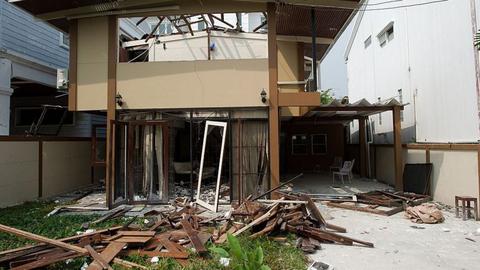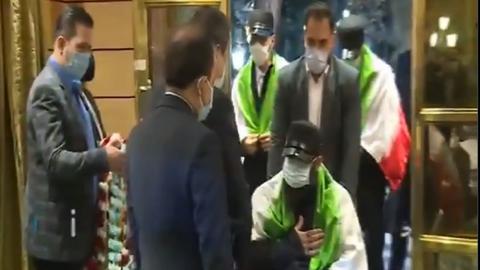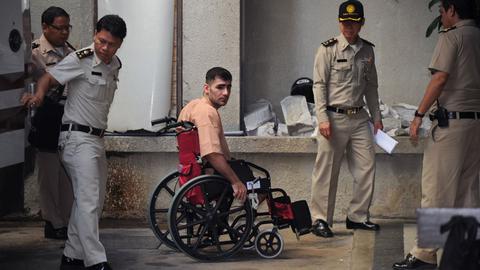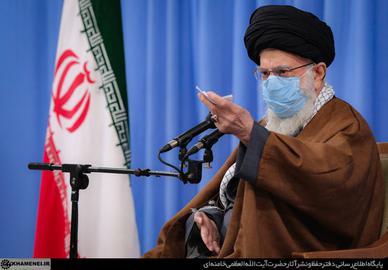On Wednesday, November 25, the Islamic Republic of Iran Broadcasting (IRIB) announced the release of Dr Kylie Moore-Gilbert, a British-Australian jailed since 2018, announcing that her freedom had followed a prisoner exchange and the return of three Iranian citizens to Iran.
IRIB did not name the Iranian citizens, referring to them only as "three businessmen,” or "one economic activist and two Iranian citizens."
But footage broadcast by Islamic Republic TV of the three entering the country and being welcomed by deputy foreign minister Abbas Araghchi confirmed rumors and other media reports that they were the three men arrested in Bangkok, Thailand in 2012 following a failed bomb plot: Saeed Moradi, Mohammad Khazaei and Masoud Sedaghat Zadeh.
Pink Day Turned Red
The explosion in Thailand occurred on February 14, 2012, Valentine’s Day — as Thai media described it, a day that was supposed to be pink quickly turned red.
After several hours of chaos, the story began to take shape and details became clearer. Moradi, Khazaei and Sedaghat Zadeh had acquired explosive devices and were staying in rental houses in Bangkok's Poon Boot neighborhood.
An explosion went off in one of the properties at noon, and the three men, who according to witnesses were wounded, fled the house in fear.
Masoud Moradi, carrying a backpack containing explosives, threw an improvised explosive device at a taxi that failed to stop for him, and when he reached a crowd near a school, he attempted to throw a second similar device at a police officer, but failed, and the bomb fell just behind him. He lost both of his legs below the knee in the blast.
When police backup arrived at the scene, they found Moradi badly wounded, with his backpack nearby and a frightened crowd looking on from a safe distance.
According to Thai media, for about 20 minutes, no one dared approach Moradi. Then, he picked up some broken glass from the ground and held it to his neck. At that point, the police rushed in, arrested him and took him to the hospital. Three Thai citizens were also injured in the incident and were hospitalized.
Two other Iranians had fled the scene. An hour later, police announced that they had arrested a second person, Mohammad Khazaei, at the airport. A bullet or bullet-shaped metal object was found in his backpack.
The same day, a Malaysian police spokesman announced that a third member of the group, Masoud Sedaghat Zadeh, had been arrested in Malaysia.
A Thai court later sentenced Saeed Moradi to life in prison for "attempting to kill a police officer" and sentenced Mohammad Khazaei to 15 years in prison for "possession of explosives.”
Massoud Sedaghat Zadeh was extradited to Thailand in 2017 following a Malaysian court order and imprisoned there.
Very early on in the investigation, Thai police identified that the three men’s target was an Israeli diplomat in Bangkok.
Two days after the bombing, a Thai journalist reported: "The magnetic device found in the explosive was probably the same type used to target the Israeli ambassador in New Delhi the day before this attack."
At the time, the Islamic Republic was repeatedly and explicitly threatening Israel and Israelis, warning that it was planning retaliatory attacks for the murders of Iranian nuclear scientists, which it said had been carried out by Israelis. "We will give a decisive and serious answer," said Haidar Moslehi, who was minister of intelligence at the time.
And yet, along with the failed attack in Bangkok, plans to bomb Israeli diplomatic buildings in Georgia were foiled, although an attack on Israeli diplomats in India injured an Israeli woman.
Three Unidentified Men Greeted by Ministry
On November 25, Iranian television did not name the three people returning to Iran. It simply showed images of the men arriving and being greeted by Abbas Araghchi.
Hours later, however, Thai officials confirmed that three Iranians convicted of bombings eight years ago had been extradited to Iran.
Thai officials, without elaborating, said that the three detainees had been transferred under existing agreements with Iran.
"Such transfers are not uncommon," Thai Deputy Attorney General Chatham Akapin told Associated Press. "We send prisoners to other countries and under these agreements, we also receive Thai citizens."
The Invite that Led to Jail
Kylie Moore-Gilbert is a lecturer in Islamic Studies at the University of Melbourne. In the summer of 2018, she traveled to Iran at the invitation of Al-Zahra University and the University of Religions of Qom to participate in its seventh conference on Shia Islam.
But after she had addressed the conference and was due to return to Australia, she was arrested at an Tehran airport and later sentenced to 10 years in prison for "spying for Israel." She spent 804 days in Iranian prisons.
In letters from prison published by the Guardian newspaper, Moore-Gilbert stated that she had been formally arrested when she rejected a request to spy for the Islamic Republic.
On the day of her release, IRIB broadcast footage of her looking frightened wearing a close-fitting hijab outside Evin Prison. She said she had visited the "Zionist regime,” a reference to Israel and most likely a statement she had been ordered to say.
Confirming her arrival in Australia, Australian Prime Minister Scott Morrison stressed that he was both thrilled and relieved by the release of Kylie Moore-Gilbert. "It will take time for Kylie to get over this terrible tragedy,'" Morrison said, adding that he had been able to speak to Moore-Gilbert on Thursday, November 26. "Her tone was very hopeful and refreshing, especially considering what happened to her,” he said.
Moore-Gilbert has not yet spoken directly to the media, but the Australian foreign ministry has issued a statement on her behalf in which she thanked the Australian government and diplomats for ensuring her release, as well as her supporters and those who campaigned for her release.
"I have only respect, love and admiration for the great nation of Iran and the warm-hearted, generous and brave people of Iran," he said.
Details of the researcher's release have not been disclosed, and Australia’s prime minister declined to comment on the matter. Morrison only emphasized that he could reassure Australian citizens that nothing would endanger their safety and that "no prisoners in Australia have been released.”
The Associated Press reported, citing flight tracking websites, that the plane, which was shown on Islamic Republic TV at Tehran airport, had flown from Bangkok to Doha and on to Tehran twice in the last week.
The tracking code of the aircraft indicates that it belongs to a private company in Australia that regularly provides services to government officials.
visit the accountability section
In this section of Iran Wire, you can contact the officials and launch your campaign for various problems



























comments